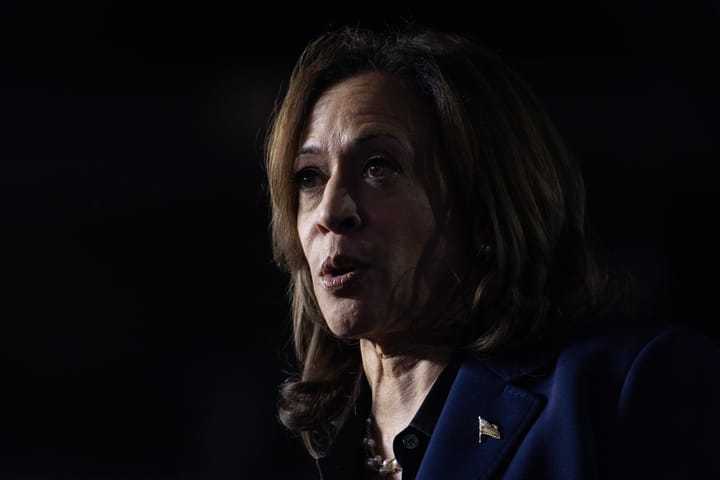Billionaire investor and “Shark Tank” host Mark Cuban has been all over the place recently to promote Kamala Harris. He has spoken at rallies, hosted fundraisers, defended her policies on TV news, and he recently recorded a sit-down interview with Harris for her YouTube channel.
The Harris campaign is hoping that Cuban can help them assuage voters who have concerns about how their plans could impact the economy. Because of his persona on the popular reality show “Shark Tank,” which he is leaving after this season, Cuban is seen as an authority on how to grow a small business and someone who cares about helping people live out the American dream.
Cuban has given his business-centric backing to every Democratic presidential candidate since 2016 and he has consistently slammed Donald Trump. Earlier this year, he said he would back President Biden over Trump even if Biden was “being given his last rites.” Because of his strong endorsement, Cuban could have a big influence on a potential Harris administration. Last month, he even suggested that Harris should consider him to lead the Securities and Exchange Commission, calling into CNBC to divulge that he speaks to the Harris team three to four times a week on business outreach.
But while Cuban has been an outspoken liberal over the years on social issues like access to abortion and the importance of diversity, equity, and inclusion factors in hiring, he’s frequently been out of sync with the Democrats on economic issues and has railed against federal agencies when they put forth consumer-focused policies that could impact his investments.
Mark Cuban Companies’ investments include tech startups in the areas of blockchain and artificial intelligence, as well as health care companies such as Mark Cuban Cost Plus Drugs, a public benefit company that sells generic medications directly to consumers at a discounted rate. Forbes pegs Cuban’s net worth at $5.7 billion.
On Big Tech, Mark Cuban opposes the government’s actions to apply antitrust laws to the largest companies like Google because, he says, he believes it would harm innovation in the development of artificial intelligence.
“The DOJ Anti-Trust Case against Google effectively comes down to: ‘If you dominate your market because you are better at AI then your competitors, we will come after you,” Cuban wrote on X in 2020 following the Trump administration’s antitrust case against Google.
More recently, he’s come out against the Biden administration’s Federal Trade Commission Chair Lina Khan, who has made tackling Big Tech company abuses through antitrust law enforcement a top focus of her tenure. When he was asked earlier this month by Semafor whether Harris should keep Khan at the helm of the FTC if she is elected, Cuban replied, “If it were me, I wouldn’t.”
"By trying to break up the biggest tech companies, you risk our ability to be the best in artificial intelligence," said Cuban.
In calling for Khan to be replaced, Cuban has echoed his fellow tech billionaire and Harris backer Reid Hoffman, who has argued that Khan is “waging war on American business.” Like Cuban, Hoffman invests in tech startups through his position as a partner with venture firm Greylock Partners.
While this position might help Cuban and Hoffman win more support for Harris among tech industry billionaires, it’s not likely to help with voters at large. The Tech Oversight Project recently conducted a poll of Democrats and found strong support for Khan and for antitrust actions against the tech industry. While the Tech Oversight Project is far from neutral on the topic—its primary cause is strengthening antitrust laws through legislation aimed at Big Tech— the results of its poll were overwhelming. The poll, conducted by Public Policy Polling, found that 80% of Democrats want the government to be doing more to take on corporate monopoly power.
After facing pushback from Sen. Bernie Sanders (I-Vt.), Teamsters President Sean O’Brien, and others, Cuban has tried to moderate his position on Khan, saying that he is a fan of what Khan has done on everything except for the tech industry. He has also said that he has not discussed Khan with the Harris campaign.
For tech industry venture capitalists like Cuban and Hoffman with investments in artificial intelligence and web3 companies, the Big Tech companies like Google, Apple, and Meta offer a way for them to cash out. These tech giants have made a habit of acquiring innovative startups in order to maintain their position in the market and stamp out competitors, and for many founders, being acquired is seen as a more viable exit strategy than going public.
In September, Cuban told Wired that he wouldn’t want to run for public office because he could do more from the private sector.
"You can't be president and change health care. You've got to get Congress behind you, and this, and that.” Cuban went on, "As an entrepreneur, you can change anything. Jensen Huang, what he's doing [as CEO of the chipmaker giant] Nvidia, he can pretty much define what's going to happen by how he prices things." Nvidia is currently under investigation by the Department of Justice for possibly using its dominant position in the artificial intelligence market in violation of antitrust laws.
Antitrust isn’t the only area where Cuban has broken with the Democrats on tech policy. In 2014, Cuban was one of the loudest voices opposing the Obama administration’s attempt to enact strong “net neutrality” regulations through the Federal Communications Commission (FCC). Cuban said the plans would “fuck everything up” and that he was in favor of creating “fast lanes” on the internet.
When the FCC voted 3-2 along partisan lines in April to restore net neutrality rules, the agency’s action was supported by senior Democratic lawmakers and opposed by top Republicans including Sen. Ted Cruz (R-Texas), the ranking member of the Commerce Committee, and Rep. Cathy McMorris Rodgers (R-Wash.), chair of the House Energy and Commerce Committee.
Cuban is also pushing Harris and the Biden administration on cryptocurrencies. In June, speaking at Coinbase’s State of Crypto Summit 2024, Cuban criticized SEC Chairman Gary Gensler’s regulatory proposals that would make it harder for firms to custody investors’ crypto assets. Cuban said at the summit that he had been lobbying policymakers against the regulations and that it was “a uniquely American @GaryGensler problem.” In a June tweet, Cuban said, “Biden has to choose between Gensler or crypto voters or it could cost him the Whitehouse.”
Mark Cuban Companies is invested in nearly two dozen blockchain startups, including OpenSea, an NFT marketplace that received a Wells notice from the SEC earlier this year threatening a lawsuit because the agency believes the assets on its platforms are securities. According to data from Arkham Intelligence, Cuban has transacted about $27 million worth of assets on cryptocurrency exchanges, though he does not appear to have a large cryptocurrency portfolio at the moment.
Cuban blasted the SEC after a years-long case cleared him of insider trading charges, telling a Las Vegas conference in 2014, “The SEC is a joke.”
On taxes, Cuban has been undermining the Harris campaign’s embrace of a Biden proposal sometimes referred to as the “billionaire minimum tax.” Under the proposal, households worth $100 million or more would be responsible for paying a minimum tax on their total income, including unrealized gains in assets like stocks, real estate, and private companies. According to the administration, the tax would only apply to the top .01 percent of American households, and half of the total revenue it would raise would come from billionaires.
In a September appearance on CNBC, Cuban said that Harris would not actually go through with implementing the tax, and that if she did he would switch his position and campaign against her in four years.
The billionaire reiterated this line recently at a town hall event in Phoenix where he was supporting the campaign. "There is not going to be a tax on unrealized gains," he said. "Kamala knows that an economy-killer like that would do more harm than good." In opposing the tax, Cuban is aligned with Trump, who has called it “the craziest idea” and said that it would drive rich people and corporations to flee the United States. Trump has also called it “a communist thing.”
The billionaire minimum tax is a popular proposal, according to Democratic Party-aligned polling operation Data for Progress. In a September poll of likely voters, the group found that 63% of all respondents support the proposal, including 82% of Democrats. The Data for Progress poll question described the proposal, including that it would include unrealized gains on private property, though it did not identify it as a Harris plan.
Harris has not been emphasizing her support for the billionaire minimum tax as she tries to win over moderate Republican voters, but according to Bloomberg a campaign official recently said that the campaign still supports the plan.
A year ago, more than 60 congressional Democrats joined as co-sponsors of the reintroduced Billionaire Minimum Income Tax Act (H.R. 6498), which has a Senate companion sponsored by Sen. Ron Wyden of Oregon and over a dozen other Democrats.
During the same September interview on CNBC, Cuban said he opposes abolishing the Senate filibuster, something that the Harris campaign has embraced in order to pass legislation to federally protect abortion access. In taking that position, Cuban is aligned with Sen. Mitch McConnell (R-Ky.), who says that getting rid of the filibuster would “break the institution” of the Senate.
The exact role that Cuban is playing behind the scenes with the campaign is unknown, but he recently let slip that he attempted to set up a meeting between the Harris campaign and fellow billionaire Elon Musk, who he praised as “one of the best entrepreneurs.” According to a report from ABC News, the Harris campaign declined the meeting because it did not think Musk would keep it private and would post about it on X. Musk has been one of the Trump campaign’s most impactful supporters through his more than $100 million in donations and his social media influence through his control of the X platform.
If Harris doesn’t win the election in November, Cuban says is willing to work with the Trump administration.
“If Trump wins, last time when he won, he asked me to help on health care, on PPE, I sat with Peter Navarro and helped him come up with a mask company and helped them grow,” Cuban said on CNBC. “I’ll do the same thing. I’m America first.”



